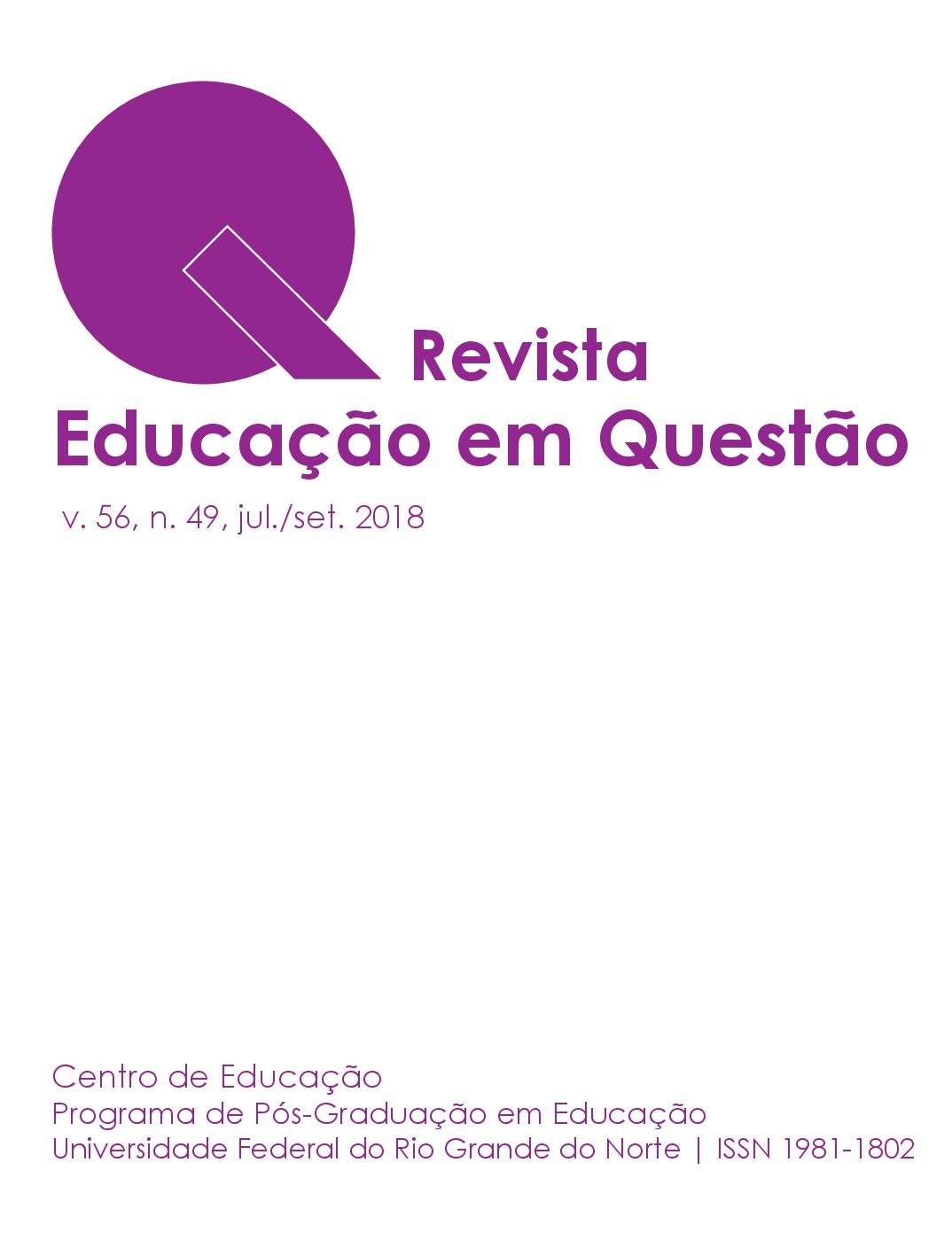Tecnologias móveis e relações interpessoais:
reflexões sobre comportamento e aprendizagem
DOI:
https://doi.org/10.21680/1981-1802.2018v56n49ID14464Palavras-chave:
Educação, Tecnologias digitais móveis, Emoções, AprendizagemResumo
As emoções fazem parte inerente da natureza e das relações humanas e sociais. Os processos educativos são influenciados pelas emoções dos estudantes que determinam seus comportamentos e possibilidades de aprendizagem. As tecnologias digitais móveis estão presentes no cotidiano dos estudantes e exercem influência na sua atenção, comportamento e relacionamentos, inclusive com conotações negativas pela priorização das interações virtuais em detrimento das presenciais. O estudo de natureza exploratória, com abordagem quali-quantitativa, visa identificar os fatores prevalentes na importância das tecnologias para estudantes, e compreender seu significado e presença na vida dos alunos. Foram entrevistados 150 alunos da série final do ensino fundamental, de duas escolas municipais do município de São Caetano do Sul. A pesquisa analisou relacionamentos interpessoais desses alunos, a relação com a aprendizagem no contexto escolar e a importante presença das mídias digitais na rotina deles. Como resultado, foi elaborada uma Matriz de Referência de Orientação Emocional.
Downloads
Referências
ABOUJAOUDE, Elias; KORAN, Lorrin; GAMEL, Nona; SERPE, Richard. Potential markers for problematic Internet use: a telephone survey of 2.513 adults. The International Journal of Neuropsychiatric Medicine. New York, v. 11, p. 750-755, 2006.
ARISTOTLE. Aristotle Quotes. Disponível em: https://www.brainyquote.com/authors/aristotle. Acessado em 12/12/2017.
BOLSONI-SILVA, Alessandra Turini; MARTURANO, Edna Maria. Práticas educativas e problemas de comportamento: uma análise à luz das habilidades sociais. Estudos de Psicologia. Campinas, v. 7, n. 2, p. 227-235, jul./dez. 2002.
CHABOT, Daniel; CHABOT, Michel. Pedagogia emocional: sentir para aprender. São Paulo: Sá Editora, 2005.
CHOU, Chien; CONDRON, Linda; BELLAND, John C. A review of the research on Internet addiction. Educational Psychology Review, v. 17, n. 4, p. 363–388, dec. 2005.
EIJNDEN, Regina van den; MEERKERK, Gert-Jan.; VERMULST, Ad; SPIJKERMAN, Renske. Online communication, compulsive Internet usage, and psychosocial well-being among adolescents: a longitudinal study. Developmental Psychology. Washington, v. 44, n. 3, p. 655-665, mayo 2008.
EISENSTEIN, Evelyn; ESTEFENON, Susana. Geração Digital: riscos das novas tecnologias para crianças e adolescentes. Revista Hospital Universitário Pedro Ernesto. Rio de Janeiro, v. 10, n. 2, p. 42-52, 2011.
FERREIRA, Marlene Cassia Trivellato; MARTURANO, Edna Maria. Ambiente familiar e os problemas de comportamento apresentados por crianças com baixo desempenho escolar. Psicologia: Reflexão e Crítica. Porto Alegre, v. 15, n. 1, p. 35-44, 2002.
GARDNER, Howard. Inteligência: múltiplas perspectivas. Porto Alegre: Artmed, 1998.
GIL, Antônio Carlos. Métodos e técnicas em pesquisa social. 6. ed. São Paulo: Atlas, 2008.
GREENFIELD, David. Virtual addiction: clinical implications of digital & Internet? enabled behavior. Presentation at the International conference course about new technologies: Addiction to new technologies in adolescents and young people, Auditorium Clinic Hospital, Madrid, Spain, 2008.
GREENFIELD, David. As propriedades de dependência do uso de Internet. In: YOUNG, Kimberly; ABREU, Cristiano Nabuco de. Dependência de Internet: manual e guia de avaliação e tratamento. Porto Alegre: ARTMED, 2011.
GOLEMAN, Daniel. Inteligência emocional. Rio de Janeiro: Objetiva, 2005.
KLIMKIEWICZ, Joann. Internet junkies: hooked online. Hartford Courant. Disponível em: https://tinyurl.com/ycde2je9. Acesso em: 12 nov. 2007.
Kraut, Robert; BRYNIN, Malcolm; KIESLER, Sara. Computers, phones, and the Internet. Oxford University Press, 2006.
SAFERNET. SaferNet Brasil. Disponível em: www.safernet.org.br. Acesso em: 15 dez. 2017.
SHAW, M. & BLACK, D. W. Internet addiction: definition, assessment, epidemiology and clinical management. CNS Drugs, n. 22, p. 353-365, 2008.
VALDIVIA, Gina Pamela Pancorbo. Propriedades psicométricas do inventário social and emotional (or noncognitive) nationwide assessment (SENNA). 2016. 88 f. Dissertação (Mestrado em Psicologia) – Programa de Pós-Graduação em Psixologia, Universidade de Brasília, Brasília, 2016.
YOUNG Kimberly; ABREU, Cristiano Nabuco. Dependência de Internet. Porto Alegre: ARTMED, 2011.
WALLON, Henry. As origens do caráter na criança. São Paulo: Difusão Europeia do Livro, 1971.
WEISSBERG, Michael. Dangerous secrets: maladaptive responses to stress. New York: W. W. Norton, 1983.
Downloads
Publicado
Como Citar
Edição
Seção
Licença
À Revista Educação em Questão ficam reservados os direitos autorais no tocante a todos os artigos nela publicados.
A Revista Educação em Questão reserva-se ao direito de não publicar artigos e resenhas de mesma autoria (ou em co-autoria) em intervalos inferiores há 1 (um) ano.






